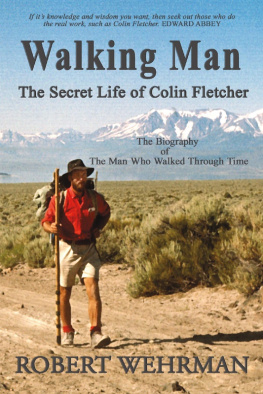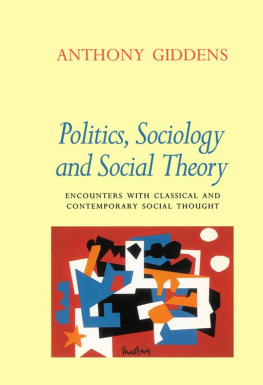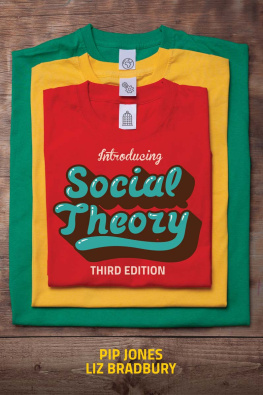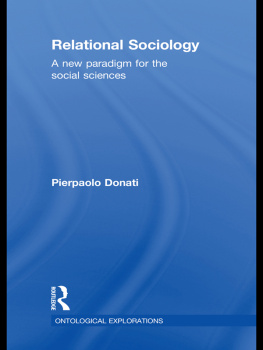ROUTLEDGE LIBRARY EDITIONS: SOCIAL THEORY
Volume 50
THE PERSON IN THE SIGHT OF SOCIOLOGY
First published in 1975
This edition first published in 2015
by Routledge
2 Park Square, Milton Park, Abingdon, Oxon, OX14 4RN
and by Routledge
711 Third Avenue, New York, NY 10017
Routledge is an imprint of the Taylor & Francis Group, an informa business
1975 Colin Fletcher
All rights reserved. No part of this book may be reprinted or reproduced or utilised in any form or by any electronic, mechanical, or other means, now known or hereafter invented, including photocopying and recording, or in any information storage or retrieval system, without permission in writing from the publishers.
Trademark notice: Product or corporate names may be trademarks or registered trademarks, and are used only for identification and explanation without intent to infringe.
British Library Cataloguing in Publication Data
A catalogue record for this book is available from the British Library
ISBN: 978-0-415-72731-0 (Set)
eISBN: 978-1-315-76997-4 (Set)
ISBN: 978-1-138-78810-7 (Volume 50)
eISBN: 978-1-315-76350-7 (Volume 50)
Publishers Note
The publisher has gone to great lengths to ensure the quality of this reprint but points out that some imperfections in the original copies may be apparent.
Disclaimer
The publisher has made every effort to trace copyright holders and would welcome correspondence from those they have been unable to trace.
First published in 1975
by Routledge & Kegan Paul Ltd
Broadway House, 68-74 Carter Lane,
London EC4V 5EL and
9 Park Street,
Boston, Mass. 02108, USA
Set in IBM Century 10 on 13 point
and printed in Great Britain by Lowe & Brydone
(Printers) Ltd., Thetford, Norfolk
Colin Fletcher 1975
No part of this book may be reproduced in
any form without permission from the
publisher, except for the quotation of brief
passages in criticism
ISBN 0 7100 8119 7(c)
0 7100 8120 0(p)
For my Mother
that she may know where I have been
Contents
I wrote this essay as a direct response to Dr Diana Leats question, But what is a person? Who are you talking about? I had reached the point of apoplexy during a seminar wherein people were patients and reduced to ciphers accordingly.
Lyn, my wife, loved me whilst I wrote out this essay. John Parker thought it had guts.
Then I left all I had written and tried to test the ideas in life. And here I acknowledge the help of those whose struggles I have shared in these last three years.
Tentatively I submitted my scruffy jottings to Peter Hopkins and without his encouragement they would have been shapeless to this day. K.E. Morgan has been the source of many strengths during this later exercise.
Grace Pearce has typed so willingly that I now feel sure of saying something even if I am still not fully sure of what I say.
But, in conclusion, I should thank God and man and the times in which we live. Is it still possible for truth and naivet to be so close?
Making a start
Problems of the nature of human nature are raised most urgently when the life-routines of a society are disturbed, when men are alienated from their social roles in such a way as to open themselves up for new insight. When social affairs proceed smoothly human nature seems to fit so neatly into traditional routines that no general problem is presented; men know what to expect from one another; their vocabularies for various emotions and their stereotyped motives are taken for granted and seem common to all. But when society is in deep-going transformation and men are pivots of historic change, they challenge one anothers explanations of conduct, and human nature itself becomes problematic.
Gerth and Mills (1954: xvii)
Sociology is not just about the development of society it is about the context of the persons development.
Man is a focus not merely of levels or dimensions but also of polarities of antithetical attitudes, principles or values. All things are characterised by both change and constancy, all realities exemplify both unity and plurality, both mediacy and immediacy, both identity and difference.
Mukerjee (1961:15)
Man has soul. This is a religious statement because it uses a religious concept. But even though man is abandoned (Sartre 1945), there is more to his life than five senses and few simple drives. There are forces that he respects and musters to enable action. These forces do not holistically make soul. Holistically, though the forces are distinct, separable and related, they do not make the person. A force is not free conscious activity.
The person is an ideal universal and to that indestructible property we take for finite life we attribute soul.
Sociology was the study and reconciliation of the citizen and the nation state in advanced capitalist societies. It is unlikely to survive intact let alone develop in the current times of internationalism and socialism.
The person cries out for beauty: for a structure which conceals nothing.
Praxiology in late capitalist states is a thread of metaphysical humanism or social idealism. It is impractical except as to the insistence on how we see one another in encouraging, enabling and enveloping ways.
Equilibrium is not possible. There is always moment and momentum for which there is no balance in man. At no time has he arrived. At no time is he stable. He can be momentarily secure in the whirlwind or at its eye. But the balanced man is an impossibility.
The crisis in sociology, that it has been benighted with sponsored tunnelling, has produced four alternatives for its young practitioners: social policy; retreats to philosophy and history; obsessions with methodologies and committed journalism.
Much of any mans effort to know the social world around him is prompted by an effort, more or less disguised or deliberate, to know things as they are personally important to him; which is to say he aims at knowing himself and the experiences he has had in his social world (his relationship to it) and at changing this relationship in some manner.
Gouldner (1969: 41)
It is not how do you hang on but why? The person has a reason for his sanity or his unreasonableness is the early warning of his path to insanity.








